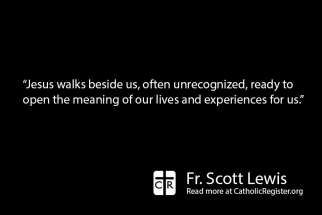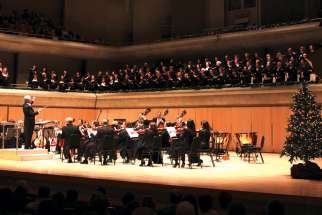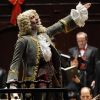We can all share in Jesus’ victory
Third Sunday of Easter, April 30 (Year A) Acts 2:14, 22b-28; Psalm 16; 1 Peter 1:17-21; Luke 24:13-35
Death could not hold Jesus. This was an important part of the first proclamation of the Risen Lord after the gift of the Holy Spirit at Pentecost. Filled and emboldened with the Spirit, Peter recounted the life, death and resurrection of Jesus, and he cast it as the fulfillment of ancient prophecy.
A nearly 300-year-old favourite has aged well
TORONTO - Even after performing Handel’s Messiah with the Toronto Symphony Orchestra for almost four decades, Patricia Krueger says the music from this Christmas classic never gets old.
Handel’s Messiah stands the test of time
TORONTO - Christmas celebrations are heralded by the senses, and none more so than sound, with music at the heart of almost all of our seasonal memories. Think Bing Crosby crooning “God Rest Ye, Merry Gentlemen” or Judy Garland rending heart strings everywhere with “Have Yourself a Merry Little Christmas” — it doesn’t get more quintessentially “Christmas-time” than that.
Coronation anthems and Christian culture
As the days grow colder and the nights longer, George Frideric Handel returns to the choir loft and the concert hall, to say nothing of the shopping mall. The naturalized British composer’s Messiah is sung by amateurs and professionals alike in these weeks. All of which is rather curious, for the celebrated “Hallelujah Chorus,” in salute of which both princes and peasants rise to their feet, is part of a vast biblical libretto — stretching from Isaiah to Revelation — and takes its place after the Ascension. So the chorus properly belongs more to Easter than Christmas, but Christmas is where it has stuck in our cultural imagination.
Handel though, especially this year, could be considered a fitting adornment for Christ the King. In 1727, Handel was commissioned by King George II to compose anthems for his coronation. Handel composed four anthems for the occasion. So magnificently did he fulfil this royal patronage that his music is now perpetually associated with the coronation of British monarchs.
Thus it was an inspired decision by the Melos Choir and Chamber Orchestra of Kingston to perform the coronation anthems at St. George’s Anglican Cathedral in celebration of the diamond jubilee of Her Majesty Queen Elizabeth II. St. George’s just being a short walk down Johnson Street from our own Cathedral of the Immaculate Conception, it was easy enough to attend the Sunday afternoon concert before returning to offer the evening Mass. For good measure, I took along the students who sing at Newman House for an afternoon of Christian culture.
Handel’s coronation anthems are settings of biblical passages which, when employed for coronations, make manifest that kingship in this world is to be patterned on the kingship of Christ. The aspiration of kings should be — literally — the listening heart of Solomon, that he might govern the people wisely.
King Solomon is the focal point of the most famous of Handel’s anthems, “Zadok the Priest.” The text is an adaptation of I Kings 1:38-40: “Zadok the Priest and Nathan the Prophet anointed Solomon King; and all the people rejoiced, rejoiced and said: ‘God save the King! Long live the King! God save the King! May the King live forever. Amen. Alleluia!’ ”
That biblical text has been used in every coronation of English (and later British) monarchs since that of King Edgar in 973 at Bath. Handel’s setting, after its spectacular debut in 1727, has been repeated at every coronation, including that of Queen Elizabeth 60 years ago. Indeed, after King George II died, composer William Boyce was commissioned to produce new settings for the coronation in 1761 of King George III. Boyce accepted, but declined to provide a new setting for “Zadok,” arguing that Handel’s setting could not be improved upon. He was right.
The Melos musicians did a splendid job of performing the anthems, and the setting of the Anglican cathedral was a reminder that these anthems are properly prayers for a gracious and noble sovereign, even as the royal anthem of “God Save the Queen” is a simple prayer.
The coronation anthems — in addition to “Zadok,” they include “My heart is inditing,” “Let Thy hand be strengthened” and “The King shall rejoice” — constitute a corpus of Christian culture. They are liturgy which soars, combining splendid sacred music with the word of God. As music does at its best, they mark something of the majesty of a moment and bring it easily to mind upon hearing just a few bars. As “Adeste fidelis” or “O Holy Night” immediately bring to mind Midnight Mass, the coronation anthems, even if performed at the concert hall instead of a cathedral, bring to mind not only the pomp and pageantry, but also the sacral character of Christian kingship.
As a liturgical genre, the anthem is an Anglican speciality, combining the textual brevity of a Roman antiphon with the power of a great hymn. The coronation anthems are a fine introduction to anthems for Catholics who may be unfamiliar with them.
A final treat from the diamond jubilee sacred music concert was the singing of the royal anthem — and not just the first verse of “God Save the Queen.” Here’s the Canadian verse for our Queen: “Our loved Dominion bless with peace and happiness/ From shore to shore/ Let our Queen’s realms all be united, loyal and free/ True to themselves and thee/ Forevermore.”
Listen to Handel’s Messiah this December to be sure; but even before Advent begins, in this week of Christ the King, listen to the coronation anthems, from the composer of Christian kingship.





